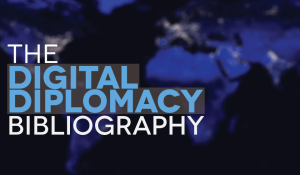Introducing the Digital Diplomacy Bibliography
Digital social media technologies have become part of people’s everyday life. They also have an impact on diplomatic practice and the way governments engage foreign publics. The conduct of diplomacy is ever more public and global. While the fundamental purpose of diplomacy remains the same, these new and emergent communication platforms are forcing us to rethink the structures and processes of diplomatic work. It is increasingly simple for governments to directly reach a broad international audience, whilst non-governmental actors and even individuals are empowered by interactive and instantaneous communication. Digital diplomacy presents tremendous opportunities for global engagement, but it also generates new problems and challenges. Determining digital technologies’ effects on diplomacy and international communication, and these technologies’ ability to strengthen networks and relationships, is a new frontier in public diplomacy work and diplomatic studies.
To facilitate the debate and study of this unfolding phenomenon, the USC Center on Public Diplomacy (CPD) and the Netherlands Institute of International Relations, Clingendael, are pleased to announce the joint publication of the Digital Diplomacy Bibliography. In the years ahead, both CPD and the Clingendael Institute will conduct research on diplomacy and public diplomacy in the digital age, and in the spirit of enhanced communication, we intend to share our findings at an early stage. The current edition of the Bibliography covers recent academic studies and practitioners’ discussions on topics related to digital diplomacy.
We would like to thank Sohaela Amiri and Martijn van Lith for providing invaluable research support in compiling the bibliography, and to Colin Hale for his graphic design. Special thanks to Craig Hayden for his review and suggestions.
Jay Wang, Director, USC Center on Public Diplomacy @publicdiplomacy
Jan Melissen, Senior Research Fellow, the Clingendael Institute, Professor of Diplomacy, University of Antwerp
@JanMDiplo
Issue Contents
Most Read CPD Blogs
-
January 29
-
January 20
-
January 28
-
January 2
-
February 6
Visit CPD's Online Library
Explore CPD's vast online database featuring the latest books, articles, speeches and information on international organizations dedicated to public diplomacy.









Add comment